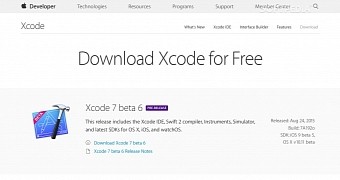Apple announced earlier the release of the sixth Beta build of the forthcoming Xcode 7 IDE (Integrated Development Environment) for its Mac OS X operating system, distributed to developers enrolled in the Apple Developer program.
Designed especially for Apple's major OS X 10.11 El Capitan operating system, Xcode 7 will include SDKs (Software Development Kits) for iOS 9, Mac OS X 10.11, and watchOS 2.0 operating systems. The release notes have been published on your member center page, so you should check them if you want to learn about the new features implemented in Xcode 7.
The Xcode 7 Beta 6 release brings in new features like support for managing, catching, throwing, and handling errors in the Swift programming language, along with the ability to seamlessly interoperate with NSError. There's also support for adding properties and methods to any class that adheres to a protocol, so you can reuse existing code.
Moreover, the ability to adopt new APIs (Application Programming Interfaces) while at the same time being backward compatible with older versions of the aforementioned operating systems has been added to the Swift language, along with a Swift 1.2 to 2.0 migrator tool, and support for writing tests of Swift 2.0 frameworks, as well as applications that have access to all of your internal and public routines.
Objective-C updates, app thinning, and debugging improvements
In addition to the new features mentioned above, Xcode 7 Beta 6 comes with Objective-C improvements, such as the ability to specify type information for collections and to indicate when to expect non-nil or nil results in the source code, support for rich-text comments, inline results, support for resources and auxiliary sources, and support for pages.
The Bitcode, Slicing, and On Demand Resources complementary technologies have been added as well, which have been designed from the ground up to deliver App Store optimized installations. Additionally, it is now possible to track energy usage with iOS 9, create instrumented C and Objective-C code for capturing memory leaks, user interface recording and testing, code coverage, crash reports, test flights, and free provisioning.

 14 DAY TRIAL //
14 DAY TRIAL //